Dustin Craven Snowboard Mag Interview
The following interview of Bonfire Outerwear's Dustin Craven by Jens Heig is one of many examples of Snowboard Magazine's superior editorial prowess. Not only do you get to know Dustin, but you get raptured into the magic and madness that snowboarding is. If you haven't seen Union Binding Co.'s STRONGER, check the trailer below and purchase the full film on iTunes. And for all the more snowboarding, check out snowboardmag.com!
Enjoy the insanity below...
CAPiTA started in 2001, and when did you start with the team?
I think in 2003 or 2004.
How did that happen?
I was at the local ski hill in Calgary. TJ Schneider [Former CAPiTA team rider] and I were in a contest together, hitting a big air jump. Then he came up to me and asked if I rode for Burton, because I was on a Burton board, and said I should ride for CAPiTA. It took a long time to get me in contact with Blue [Montgomery, CAPiTA Co-Founder and Owner] in the months after that, but finally I talked to him. Actually the first time I called Blue; their IT guy’s name was Dustin. So he started having a 15–20 minute conversation with me about how I was doing, even though I was the wrong person. That was my first nickname at CAPiTA, Little D.
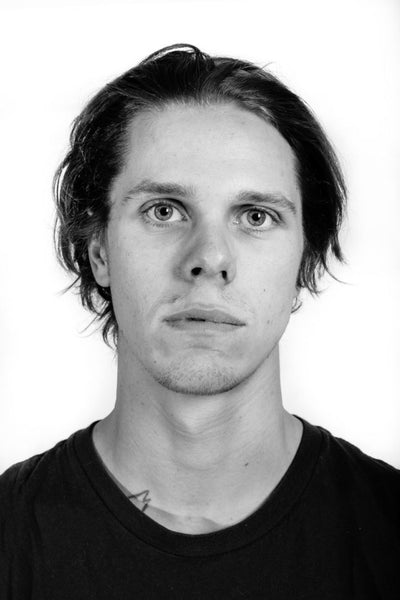
Photo: Jeff Patterson
And you just played along with it?
It was kinda just catching up and pretty basic. So it took a little bit before Blue was like, “Wait a minute.” I said, “This is Dustin Craven.”
So you were what, 15? What were you thinking when all this was happening?
It was super. I didn’t even have a shop sponsor at that point. The whole process of it was amazing. Like, I didn’t have to pay for boards anymore. But that first year, I didn’t have a board. Then TJ gave me some of his, which was really funny. He’s six feet tall, so they were way too big for me and had no edges. Then Blue had a bunch of the younger guys down to his house in Seattle for a trip, and that was my first snowboard trip. So going on the road, and talking to my mom to get permission, that was the start of it all. It was a different world, not going to your local ski hill anymore and doing the same thing. It becomes more real.

One way... or another. | Photos: Chad Chomlack
So you grew up with them in a lot of ways. As far as being a 15-year-old with a bunch of older guys, what was that like?
Growing up at that age with TJ comes with professionalism. TJ was so good at being a professional snowboarder, so being around him taught me a lot about that. Just growing up with the company and Blue, I was a young teenager. Blue just saw me as a cute little grom, then I went into my terrible teens with him, then an adult. He got a bit of everything. Blue was there the whole time, whether it was setting me straight or giving me a pat on the back. We did it all.
You mentioned the terrible teens. Can you elaborate on that?
Starting drinking, had a whole bunch of opportunities and started getting really cocky about it—I thought I was the best. I thought I had accomplished stuff already, when really I hadn’t done anything. People eventually put me in my place. I took so many right turns, but for every few right turns in my career, I would always take a sharp left. Then Blue, or an older person I would snowboard with, they were always there to tell me I was being an idiot.
"I thought I had accomplished stuff already, when really I hadn’t done anything."
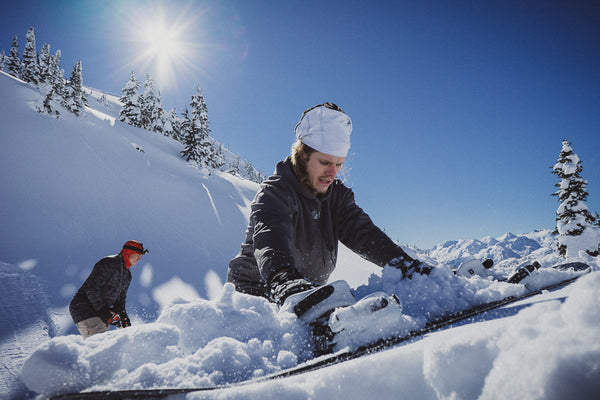
Was there ever a moment when you realized that it had to change? Or that you really fucked up?
Yeah, I was fired by multiple companies over the years, and I would always call Blue. He would be my first call. I would get fired and he would already know, because whoever was going to fire me would call him. It definitely was an interesting situation, but that’s just the process of growing up, I guess. It was never a big shock to anyone; it was me being stupid to not see it coming, to fix what was going on. So I would always make mistakes. Every time you make one, you learn and go from there.
But Blue stuck with you the whole time. Why do you think that? Because you’ve been on CAPiTA the longest out of anybody on the team, right?
Yeah. Honestly, even I ask myself that question sometimes. Why did he do it? I guess he really did love me as a snowboarder and as one of his kids that he saw come up. He believed in me. I don’t know. It was just something that he saw through. I think about it so much, and how many times that my snowboard career would be over if it wasn’t for CAPiTA. The longer I rode for CAPiTA, any company I approached afterward was impressed that I was associated with them for so long. I’m very fortunate for that, for them sticking around.
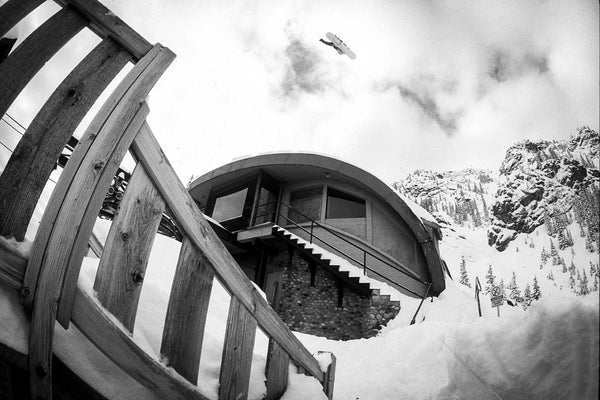
Photo: Jeff Patterson
"I think CAPiTA is a lifestyle."
What has been your experience with seeing that team and company evolve over the years?
Blue was lucky when CAPiTA started to have a good crew that wanted to be on the team. Like-minded individuals. It was perfect for the art direction and the way CAPiTA wanted to be. Blue also saw a lot of potential in some of us younger guys, and just set that up on the back burner as an am team. He just stuck with us. You could see the progression. Like [Dan] Brisse, boom. All of the sudden he’s huge. It’s still like that, just a slow progression of these ams that are super talented, are waiting and believe in the company. Then they have these older guys on the team to look up to and be mentors. CAPiTA’s not the biggest three-year contract you’re ever going to have, but you can have your entire career here, be happy, and everyone will always respect you for it.
Like TJ was to you when you were a kid, do you have that same role with anyone else on the team?
I have so much respect for the pro team, because everyone is so phenomenal on it, and it’s so big right now. I’m not as much of a team leader, because everyone on the team has matured and they’re all so good at what they do that it doesn’t really need that mentorship or leadership. I’m still so busy being… not really a full grown adult that I really don’t want to mentor anyone. I still want to be as good as everyone on the team, so I’m not as concerned with passing down my knowledge when I’m still trying to learn so much.
Who are some of the up-and-coming guys that you’re excited about on the team?
Worm [Garrett Warnick]. I think Worm will take my job.
Why do you say that?
I just think he’s phenomenal. He’ll probably be our next addition to the pro team. His last part in Absinthe was super good. Johnny O’Connor too. I don’t follow the jib team as much anymore, but whenever you watch him jib you’re just like, shit. That’s so smooth.
He’s a natural.
Yeah it’s just natural. Both of those guys are so nice to be around, you can see that they’ll be in it for a long time, and it will be good for CAPiTA.
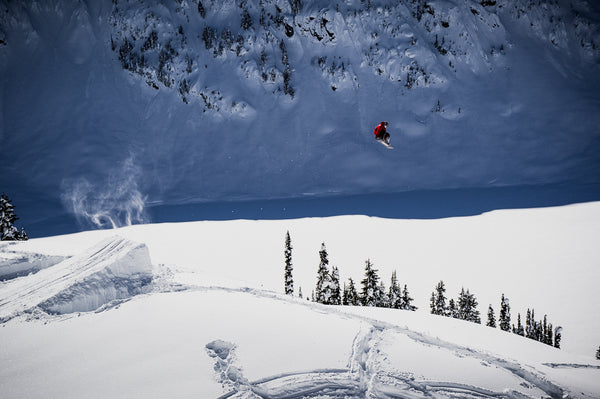
Dustin went absolutely huge in STRONGER. | Photo: Chad Chomlack
"To fully commit my brain to thinking I’m going to be something else is career suicide."
Do you think that partying’s role in snowboarding has changed over the years?
I don’t think younger people think they have to party and they have to snowboard. I think people treat it with a little more respect than they used to. They do the partying afterward. All the guys that are super good at snowboarding, doing contests and stuff, they’re doing a really good job; they still party afterwards. There’s a time and a place, it doesn’t have to be every night.
What are you trying to accomplish right now?
Right now, it’s just trying to be a better snowboarder. Progression in the backcountry takes time: to learn how to sled, how to build jumps, and where to build jumps. I’m finally so comfortable with that, being out there, feeling safe, taking courses for avalanches, and other people in the crew take them. So we’re all out there, and there is less stress.
When did you move to Whistler?
Six years ago.
Do you think you could have stayed in Alberta and had the career that you have?
No. When I lived in Alberta, I was living in Banff and was partying a lot. That was a tipping point in my career. If I stayed there, I probably wouldn’t have a career anymore.
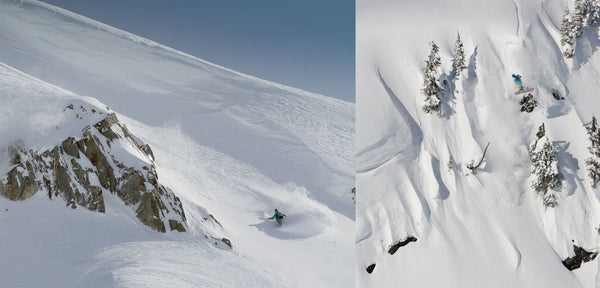
Photos: Jeff Patterson
Just getting partied out?
Yeah, and I moved to Squamish, which is an hour away from Whistler. There’s not really a party scene there. I just started taking it more seriously. The Whistler backcountry is Mecca, so I moved on to learning a new role from Benji Ritchie, Eero Niemela, Mikey Rencz, that way of life—working hard and not really taking anything for granted.
Do you think that’s part of what has led to your longevity? What do you think has kept you at your level for so long?
You’re your own worst enemy, in every sense. Every year I accomplish something, but every year I’m like, son of a bitch—I want to do way better. What are you doing? How are you going to change it? How are you going to keep moving? I’m so preoccupied with trying to be better that it never comes to a stalemate, where I don’t have anything to improve on. If you lose that mindset… I’ve seen it in older snowboarders. Even when TJ retired, you can see when they’re transitioning into a different mindset.
Yeah, it’s contentment.
You don’t have that drive anymore. People always ask me, “What are you going to do after snowboarding?” If you’re thinking about what you’re doing after, then you’re not really thinking about what you’re doing now. Right now, I’m still pretty preoccupied with being the best snowboarder I can be. To fully commit my brain to thinking I’m going to be something else is career suicide.
"You’re your own worst enemy, in every sense."
With STRONGER, what are things that you’re really hyped on or could have done better?
I sprained my ankle at the end of the season. The back 10 at the end of my video part was the last jump I hit all year. The try before I landed it, I sprained my ankle. So I took three weeks off, went to Alaska and was trying to ride with it. That was awesome, but it was a missed opportunity. I had one of the best seasons of my life, was feeling so strong riding and the sprained ankle stopped me from doing anything I wanted. That was my only thing of the year. Everything else was awesome. I got to spend it with Brisse, I got to go out with Kazu [Kokubo] a ton, go with Gigi [Rüf] in Alaska. My first time in Alaska, I got to be in a helicopter with Gigi and Kazu.
What did that do for your riding?
It just makes me so comfortable. Those guys know what they want to do and what they’re doing. I ride with Kazu quite a bit, so he knows my level of comfort. We talk about lines when we’re doing other things. So when I get dropped off, it’s boom boom boom. Everyone just knew what they were doing. That was awesome. I feel like it would be the same when I take people out sledding. I’m very comfortable sledding and know where things are. If you’re around super comfortable and confident people, it just makes everything go easier because you’re not running around like a chicken with your head cut off.
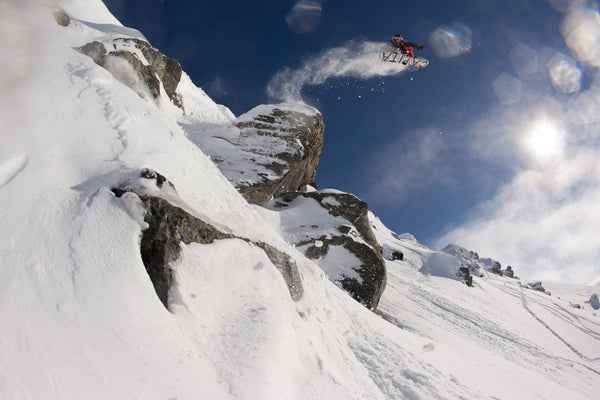
An oldie, but a good one. | Photo: Jeff Patterson
You’ve always been someone that isn’t afraid to speak your mind. It seems to have worked, but there aren’t that many riders that aren’t afraid to put themselves out there. I think it speaks a lot to the foundation of CAPiTA, right? To do you, say what you want to say and do what you want to do. Then move on with it at the end of the day.
At the end of the day, whatever you do and say, like if there’s any regrets with what I did. Not really. Why would that bother me? It’s what happened. It has definitely made me who I am. A lot of things could have been different, but a lot of things could have been a lot worse. To have a career with CAPiTA for thirteen years is fucking awesome.
What board do you ride?
I ride the Mercury 157. This is the first year I rode it. I usually ride the 56 DOA [Defenders of Awesome]. I think the Mercury is a bit stiffer so I started riding it. It’s a bit of a pow dog. But this year I might switch to The Black Snowboard of Death, because it’s even a bit stiffer than that.
Any closing thoughts?
With CAPiTA, all the love from everyone—it’s more than just Blue. It’s everyone behind that company, all the way down to guys in the factory. Everyone is a diehard CAPiTA fan. Even on the team side, everyone there is all for CAPiTA. Feeling that through the years, seeing the same people, everyone has so much respect for everyone. For snowboarding, I think CAPiTA is a lifestyle.
---------
Note from Bonfire: this interview was originally published by Snowboard Magazine on snowboardmag.com. Dustin Craven rides Bonfire Outerwear's Kane Pant and Klamath Jacket. Find both in our full catalog HERE.




Leave a comment